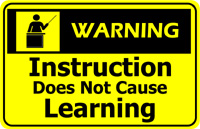They say the densest material on earth is something called “Chengdeite“. But this morning I was listening to a reporter on NPR, and I’m thinking we’ve got a new competitor in the race.
 The story was about how a Boston school district was wondering if they could improve teacher skills by modeling a “resident” program after medical school — where a new teacher taught side-by-side with an experienced teacher rather than just jumping in to a tough school with little or no experience.
The story was about how a Boston school district was wondering if they could improve teacher skills by modeling a “resident” program after medical school — where a new teacher taught side-by-side with an experienced teacher rather than just jumping in to a tough school with little or no experience.
Wow! Stop the (virtual) presses, Jeremy! Better get this one on the air!
They went on to interview people in the program, a guy at the Harvard School of Education, and several “actual students” — all of whom, surprisingly, agreed that getting some practical experience would be a good thing.
Uh, huh. Incredible. Better get that news to Plumbers, Electricians, Surveyors, Air Traffic Controllers, Cake Bakers, Serial Killers and DMV Employees nationwide.
Sometimes it’s enough to make an education wonk weep.

{ 4 comments… read them below or add one }
I heard the same story this morning, although only part because it was interrupted by a demand for WonderPets and a banana (hey the kid has priorities). As I understood it the gist of the story was that the beginning teachers were getting more on-the-job training and in a more realistic setting than they typically would student teaching, which in most education programs is only about a semester. Many of my friends who’ve done their student teaching and graduated have said they spent most of their time grading papers & other administrative for the teacher they’re assigned to (which, granted they’ll need to know how to do as well).
Yes plumbers, electricians, surveyors and the like often enter their trades as apprentices and move on to become journeymen, etc., but teachers spend four years (or more these days) in college, a semester in the classroom and are then thrown to the wolves, um children. In addition, they often have no framework for dealing with problems with school administration and parents. I know several people who have gotten out of teaching altogether after a year or two because of these very problems.
And that’s where a teacher’s residency makes sense. I think (or hope) that was the point of the NPR story. Perhaps the story wasn’t executed or edited as well as it could have been, but again I didn’t hear the whole thing thanks to sippy cups and cartoons.
@Tonya — While I applaud the idea of giving ANYONE actual on-the-job experience to improve their performance, I was just reacting to the breathless amazement that the NPR folks brought to the idea.
OF COURSE it would help them. That concept, in a nutshell, is what education is all about. I’ve spent most of my professional life arranging opportunities for technical people to actually DO things to learn.
The tiny little issue of a 3rd-grade teacher now having student loans right up there with a Cardiac Surgeon somehow escaped their reportage.
Dick,
The extra students loans are a complication I hadn’t thought of, and you’re right. It would also allow the public school systems more easily take advantage of new teachers – free labor and all.
A better system would something more akin to the apprentice/journeyman/master concept in the trades. Apprentices have direct supervision, but they get paid SOMETHING for the work they do. It might costs schools more money in the short-term, but it might actually IMPROVE education in the long-term.
And I have to admit, these are not issues I would normally take a great interest in, but having a 2-year-old has me thinking more and more about the course of public education in the course over the next 3 to 5 years.
@Tonya –
I did a post a while back on the idea that we don’t necessarily need better teachers — we need to standardize what we teach, how we teach it, and provide lots of technical support for that learning. In my world (corporate) it’s getting very unusual that you go and sit in a room all day with a great teacher to learn something.
There’s lots of learning in the K-12 book that could easily be taught online, or using teachers without world-class skills. And, unfortunately, we’re never going to have the education budget to train and compensate the “amazing teachers” that everyone wants.
It’s amusing to watch all the big heads talking about how to “solve” this problem. Just ask the people doing the work.